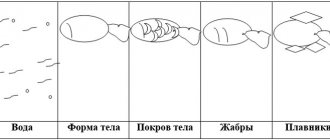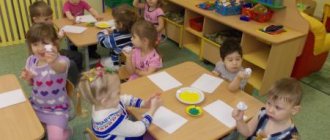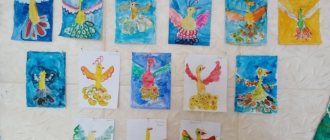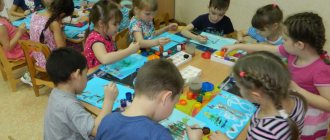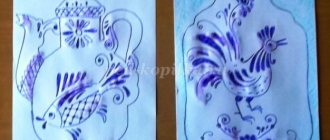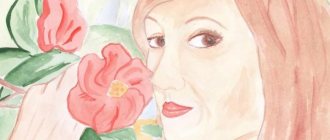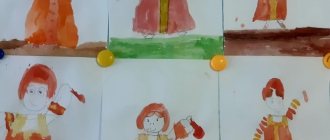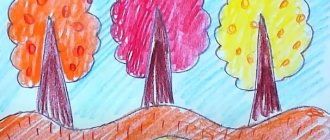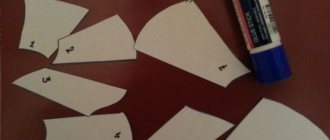Abstract of OD on drawing “The Tale of the Fisherman and the Fish”
Nadezhda Rusina
Abstract of OD on drawing “The Tale of the Fisherman and the Fish”
Goal: to evoke a desire to convey the semantic relationships of a plot-pictorial composition through artistic expression.
Basic knowledge, skills and abilities of children: they know the content of “ Tales of the Fisherman and the Fish ”
A. S. Pushkin;
can tell and describe its main characters, depict episodes from a fairy tale on paper , demonstrate good technical literacy;
know how to work with gouache and watercolors, use a palette; know and distinguish between cold and warm colors and their shades.
Preliminary work: examination of illustrations with a variety of fish , familiarization with reproductions of paintings by the marine painter I.K. Aivazovsky; reading " Tales of the Fisherman and the Fish "
A. S. Pushkin; watching the cartoon of the same name; musical and theatrical activities; working with gouache and watercolors; performing practical exercises on the palette; consolidation of knowledge about colors and their shades.
Equipment and materials: audio recording of sea surf, background music; samples of drawings for a fairy tale ; presentation “Views of the sea”
; white sheets of paper; palettes, gouache and watercolors; a simple pencil; brushes
Preview:
Organized educational activities in the preparatory group of the compensatory orientation of the NGO “Artistic Creativity”: Drawing
The Tale of the Fisherman and the Fish
Materials: white sheet of paper, watercolor paints, foam sponge, brushes, napkins for each child.
Methodological techniques: demonstration and explanation of the teacher, questions to the children, game situation, musical accompaniment, reminder of drawing techniques, observation of the children’s work, individual explanation, analysis of the work of the teacher and children.
Preliminary work: introducing children to the technique of drawing “on a wet” sheet, reading a fairy tale by A.S. Pushkin “The Tale of the Fisherman and the Fish”, examination of illustrations for this work, examination of pictures and photographs depicting sea inhabitants.
Progress of organized educational activities:
— We will draw “on a wet” sheet.
- Now I’ll read you an excerpt from a fairy tale, and you guess it.
“An old man lived with his old woman by the very blue sea.”
-This is a fairy tale by A.S. Pushkin "The Tale of the Fisherman and the Fish".
-That's right, listen further:
“They lived in a dilapidated dugout, the old man was catching fish with a net, the old woman was spinning her yarn. The grandfather was kind, the old woman was calm, and they had peace and harmony in the house. And nature was calm: blue sky, calm sea.”
-Guys, what color do you think the sea was?
-And in this calm blue sea lived a kind magical “golden” fish, but she did not live alone, who else lived in her magical country-underwater kingdom?
-Does the water in the sea move?
-Moves when the wind blows, ships sail.
-How to convey the movement of water in a drawing?
-Waves on the surface of the sea, and in the depths the algae are swaying, the sand is pouring, the fish are moving.
-Look how I will draw the sea. I wet the sheet with a sponge from left to right with quick movements. With a wide brush I draw a line on top of the sheet, and the paint spreads down, etc. And you will draw a strip and lift the leaf vertically so that the paint also drips off. Let the paint dry a little, and we will paint the inhabitants of the underwater kingdom with a thin brush. We draw algae, sandy bottom and all the inhabitants of the magical sea country. If you want, you can depict the fairy-tale palace of the “golden” fish in your drawing. The children do the work, the teacher observes the drawing, and conducts an individual demonstration if the children have difficulty.
When all the guys have finished drawing, put the leaves on one large table, you get an “underwater kingdom.”
-What a huge calm blue sea we have. And the inhabitants of the underwater kingdom move calmly in the water among green algae. And because the sea is peaceful, calm and there are a lot of goldfish, they are all so bright and beautiful. When I look at your drawings, I feel that goodness is triumphant in this magical land. And the old woman and the old man have peace and harmony. The old man also catches his fish, and the old woman spins yarn. And everything is just beginning, and the whole fairy tale is yet to come.
On the topic: methodological developments, presentations and notes
Summary of organized educational activities. Educational area “Reading fiction”. Topic: “Reading a fairy tale by A.S. Pushkin "The Tale of the Fisherman and the Fish". Goal: introduction to the fairy tale.
A game drawing lesson for children of the middle group based on the fairy tale by A.S. Pushkin “The Tale of the Fisherman and the Fish.” Goals: Continue to teach children to draw using the poking method using a foam rubber tampon. Secure.
What a miracle these fairy tales are. Application based on the fairy tale by A. S. Pushkin “The Tale of the Fisherman and the Fish.” On the occasion of the memory day of A. S. Pushkin, we decided to arrange an exhibition of children's works dedicated to the work of the poet. For this purpose h.
Technological map of fine art medium group: “Goldfish”
Listen, from which fairy tale by A. Pushkin is this excerpt? “For the third time he cast a net, - A net came with one fish, With a difficult fish - a gold one.” Who is the fairy tale talking about?Where does the goldfish live?
Let's take a look into the underwater world! What is happening there? How beautiful it is: there are colorful pebbles on the sandy bottom, green algae bending under the water. And who is this swimming? Gold fish. (Showing a blank for group work). What color is the fish? Big or small? What do you think helps the fish swim? When a fish swims, its tail moves from side to side. (The teacher shows the movements of the fish with his hand and invites the children to also do with their hands like a fish with its tail).
Do you think the fish sees us?
What do her eyes look like?
Do you want to play fish?
Physical education minute: “A rowan tree grew by the river (crouching, gradually straightening the body, shaking hands up). And the river flowed, rippled (with smooth movements of the hands in front). In the middle there was depth (bending forward, arms straight). A fish was walking there (walking This fish is not easy (jumping). It’s called golden (walking in place). The fish swims in the water (smooth movements of the hands in front) The fish has fun playing (jumping) Fish, mischievous fish We want to catch you. The fish arched its back (bend over backwards) and stretch) She winked at us with her eye. The fish waved its tail, The fish quickly swam away.” (Children pretend to be frolicking fish).
The goldfish wants to tell us something. You see white bubbles rising from her lips. Oh, trouble, trouble! The fish lost its sisters, the goldfish. She is sad without them. Guys, we need to help the fish! Do you want to learn how to paint a Goldfish? (showing a drawn sample of a fish).
Think about what form is the basis of its image?
What else does the fish have?
I’ll try to draw a fish, I’ll take a large brush and yellow gouache for work. I will draw an arc on top and an arc on the bottom so that it turns out to be an oval. The arcs should intersect in one place, this will be the tail of the fish. (Showing the drawing sequence).
I carefully paint over the oval. And I let it dry. Then I take a smaller brush and paint the fish’s tail and fins.
What else should you add to the fish?
Right. The fish definitely needs to draw scales. (show) So I got a goldfish.
And now you try to draw the Golden Fish and her sisters, as you remember. But first, let's stretch our fingers.
Finger gymnastics: “Fish” “The fish swam, dived, In clean warm water (fold your fingers in a pinch, making wave-like movements with your whole arm - from the shoulder to the hand): They will clench (clench your fingers very tightly), unclench (spread your fingers to the sides), Then they will bury themselves in the sand (put your fingers together and alternately make movements with your hands, as if you were digging up sand).
With your fingers stretched, let's start drawing fish.
Abstract of the educational activity “Goldfish”. Drawing with cotton swabs. Senior group
Daria Kavun
Abstract of the NOD “Goldfish”. Drawing with cotton swabs. Senior group
Summary of GCD in the senior group on the topic “Goldfish”.
Author: Daria Aleksandrovna Kavun, teacher at MBDOU Kindergarten No. 15 “Silver Hoof”
Surgut, Tyumen region, Khanty-Mansi Autonomous Okrug."
Description: Abstract of GCD for children of the older group (5-6 years old, on the topic “ Goldfish ”
.
During this direct educational activity, children become familiar with the non-traditional technique of drawing with cotton swabs .
Summary of GCD in the senior group on the topic “ Goldfish ”
.
Integration of educational areas:
• Introduce children to an unconventional drawing technique - pointillism ( drawing with cotton swabs )
Educational: Develop the ability to independently choose the color scheme of paints; Reinforce drawing with different familiar materials, choosing them according to your desire and mood.
Developmental: Develop color perception, improve fine motor skills of fingers and hands; Improve hand-eye coordination.
Educational: Cultivate a sense of responsiveness to other people’s experiences, a desire to help; Cultivate accuracy and the ability to find non-standard solutions to creative problems.
Equipment used: Outline of a goldfish on album sheets , gouache, cotton swabs , water containers for each table, wet cloth wipes for hands according to the number of children.
Methodical techniques: Game situation, conversation-dialogue, problem situation, productive activity of children, reading fiction, analysis, summing up.
